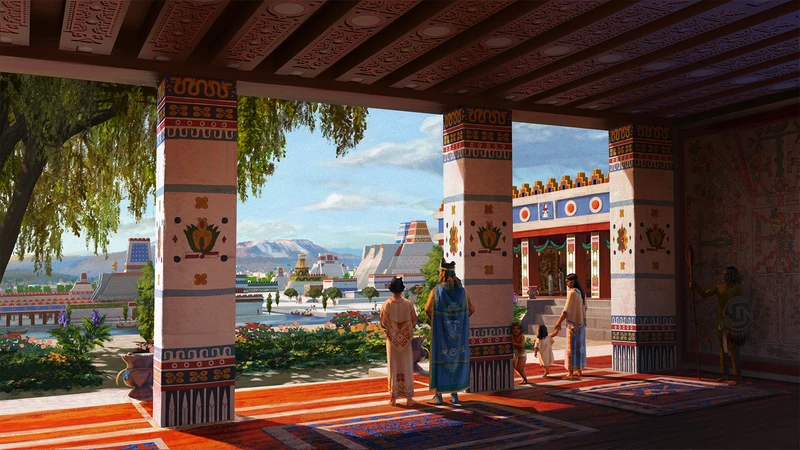This tips will ensure you will set up a profitable city on your first try in Tlatoani Aztec Cities.
Tlatoani Aztec Cities: Beginner Tips
Note: This guide is intended for general scenarios and random maps, not specifically for campaign missions.
- Food Production: Build 6 Peasant/Farm Houses with Maize fields, ensuring fields have canals for added fertility. This setup provides adequate food production initially, with room for expansion as needed.
- Basic Facilities: Construct a Market to distribute goods to homes, a Granary to store food, and a Mason Yard to maintain buildings and manage porters for transporting materials.
- Wood Production: Set up 4 Sawyers for wood, placing 2 near the Trading Post and 2 near your Kilns (once they’re available).
- Commoner Workforce: Build 6 Commoner Houses to serve as the main non-food production workforce.
- City Health and Mood: Establish a Sweeper, Sentry Post, and Well Dipper to maintain health and mood levels in the city.
- Clay and Pottery Production: Build 4 Clay Pits, 4 or more Kilns, and 1 Porter Yard. Set Porter Yards to either “Accepting” or “Getting” clay and pottery.
- Trade: Once you have reserve stock, sell Timber and Pottery at the Trading Station. Set these items to “Balanced” or “Exporting.” Disable any unnecessary imports at the Trading Station to manage expenses, but monitor essential goods since some may not be available on all maps.
- Mood Boosters: Build 2 Shrines, 1 Alcove, a Gardener, and Gardens for the Herbalist to enhance city mood.
- Tax and Education: Construct 1 Collector for tax gathering and 1 Telpochcalli/School to educate citizens.
- Monitor City Mood: Keep mood above 50% and ensure enough workers are available as you expand. Low mood will deter new workers from coming to the city.
Quick Tips
In Tlatoani, maintaining efficient logistics is crucial. Place porter depots, trade posts, markets, granaries, and production buildings within an optimal travel distance. Although porters can move across the entire map, proximity boosts efficiency.
If you’re new to city-builders like Pharaoh or Caesar, remember to set the storage allowance for each good in every storage facility. To extend access to goods, especially for markets out of range, link storage facilities close enough to each other and set goods to either “Accepting” or “Getting.”
Facilities near production buildings should be set to “Accepting,” while those transporting goods closer to markets should be set to “Getting.”
Early on, avoid excessive imports at trading posts, as rapid expansion without establishing export goods can quickly drain funds.
Even if a building requiring symmetry is placed in an area lacking symmetry, adjustments afterward can still achieve the desired balance.
Monitor city mood regularly; poor morale can lead to a difficult-to-recover decline. Pottery is one of the easiest goods to set up for export in the early game and can make cities profitable.
Buildings receive bonuses from nearby supervisory buildings, visible in the bottom right of the building info UI. Hovering over them shows the current and maximum possible bonus.
